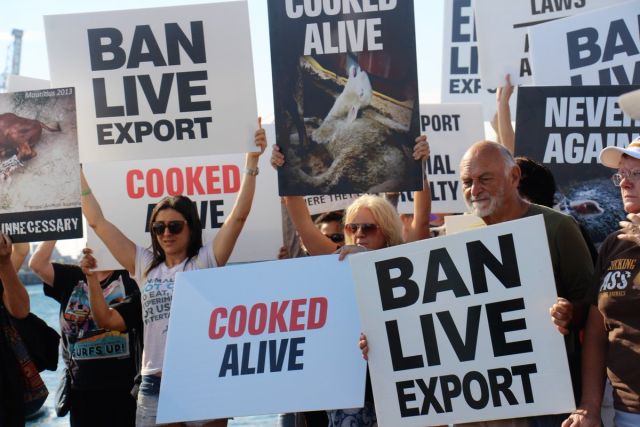
Last month millions of Australians saw footage of sheep dying slowly from heat and thirst while being shipped on the Awassi Express from Fremantle in Western Australia to Doha, Qatar.
That voyage was last August, what viewers saw was a very small portion of the suffering undergone by the 2400 sheep that reportedly died on that one voyage. The suffering came to light only because a whistleblower working on the ship was so disturbed by what he saw that he took video and sent it to Animals Australia.
Federal Agriculture Minister David Littleproud, a Nationals MP from rural Queensland with a background in agribusiness, said he was “shocked and gutted” by the footage. As Littleproud’s reaction shows, it is not just those at the vegan/animal-rights/green end of the political spectrum who are horrified by these scenes.
On many other occasions, I have argued that we ought to give the same weight to the suffering of animals as we give to similar forms of human suffering. In my view that means that in most circumstances we shouldn’t be eating animals at all, but that is not the main issue here. Even those who think that human interests normally override the interests of animals can see that what happened on the Awassi Express was wrong and ought not to be allowed to happen again.
So what did Littleproud do? He set up an inquiry. Fair enough. But to head the inquiry and make recommendations, he appointed Michael McCarthy, a vet who has spent most of his career working as a paid contractor to the live export industry, including work for Emanuel Exports, the company that stocked the Awassi Express.
It wasn’t a surprise, therefore, to read that McCarthy did not recommend an end to the live export trade. He did not even go along with the recommendation of the Australian Veterinary Association, which favoured suspending the trade for the northern summer. The association said that during those months there is no way to eliminate the risk of sheep suffering and dying from heat stress.
Instead, McCarthy ignored a decade of data showing that lower stocking densities do not overcome the welfare problems that frequently occur in hot weather. He recommended that the trade continue, with lower stocking densities and some other requirements, none of which can guarantee even a minimally decent standard of animal welfare.
The suffering goes on
After seeing the suffering of the sheep, Littleproud said: “This cannot go on.” But under McCarthy’s recommendations, it will go on.
We’ve seen it all before. In July 2016, more than 3000 sheep died on the same ship, the Awassi Express. It’s a recurring pattern: every few years more evidence of the suffering of the sheep comes to light, there are expressions of shock and outrage, new conditions are imposed on the industry, things go quiet for a while, and then it all happens again.
Why? In the moral framework in which the trade operates, sheep are cargo, something to be moved from A to B because you can get more money for them at B than you can at A. Of course, the less you pay for the transport the more you profit, so exporters are always going to try to cut corners.
Sheep are not iron ore or wheat. They are sentient beings that cannot protest against what we are doing to them, except by dying. We are handing them over to people who have no special concern for their well-being, on a ship far from the eyes of the media. We may put veterinarians or other observers on board, but on a long voyage it is only human nature to try to get along with the others on board and not cause problems. The mistake is to put the sheep in such a vulnerable situation in the first place.
Even the sheep who survive the journey and are landed in the Middle East remain vulnerable. Once landed, we have no control over how they are treated and slaughtered. No regulations can prevent Australian sheep being taken to a place where they may be bought at a local market, trussed by the legs, dumped in the boot of a car and driven home to have their throats cut, fully conscious, by an inexperienced person celebrating Eid al-Adha, the Festival of Sacrifice.
If we were living in desperate poverty, we might have some excuse for putting our survival ahead of the suffering of sheep. But Australia is one of the world’s wealthiest countries. We do not need to continue this trade, and it is not difficult to see that what we are doing is wrong.
The best hope now lies in a bill that Liberal MP Sussan Ley is planning to move in parliament to end or at least phase out the live export trade. Senator Derryn Hinch and the Greens have also been strong supporters of halting the trade.
This is every bit as much a question of ethics as equal marriage, and members of parliament should be free to vote in accordance with their conscience.
If a majority votes against the trade they would remove a stain from our national conscience too.
[Peter Singer is Professor of Ethical Issues in Biotechnology, Justice and the Human Good at the University of Melbourne. This article was originally published at The Conversation.